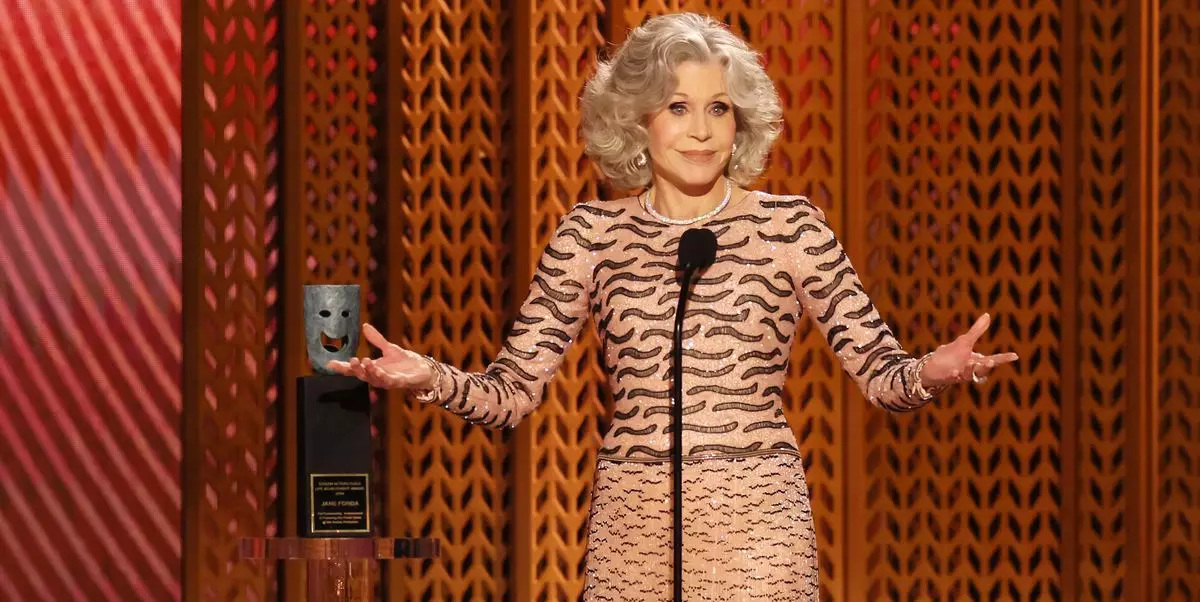During the recent Screen Actors Guild (SAG) Awards, actress and activist Jane Fonda was honored with the prestigious Life Achievement Award. At 87 years old, she received the accolade to overwhelming applause, embodying the spirit of tenacity and inspiration. Fonda, renowned for her extensive and impactful career, utilized her acceptance speech to reflect not only on her personal journey in the entertainment industry but also on broader societal themes that resonate deeply within contemporary discourse.
Fonda humorously acknowledged her status as a “late bloomer,” revealing how her return to film at the age of 65 and subsequent successes in her 80s challenge the conventional timelines associated with career achievements. Her light-hearted quip about potentially performing her own stunts in an action movie during her 90s serves not only as a testament to her indomitable spirit but also as a motivational call for others to pursue their passions regardless of age. This notion reinforces the idea that it is never too late to embark on new ventures or reclaim one’s dreams.
A significant theme that emerged from Fonda’s speech was the necessity of empathy, especially within an acting community that plays a crucial role in mirroring societal emotions and struggles. By addressing the changing landscape in the United States and the increasing attacks on workers’ rights, particularly through the lens of unions like SAG-AFTRA, Fonda emphasized the importance of unity and collective strength. For her, community signifies power; an essential element that contributes to the safeguarding of marginalized voices and the promotion of inclusivity.
Her comments reflect a broader awareness of the socio-political climate in which art and activism intersect. Fonda urged her fellow actors to embrace empathy as a tool for understanding and portraying complex characters, suggesting that their primary role is not just to entertain, but to invoke understanding in their audiences. This is particularly vital in a divided society where empathy is often sidelined in favor of individualism and conflict. The idea that actors have the unique capacity to bridge emotional divides highlights the profession’s potential as a vehicle for social change.
In her speech, Fonda also took a firm stance against the politicization of the term “woke,” which has recently been weaponized against advocacy for diversity and inclusion. By asserting that “empathy is not weak or ‘woke,’” she challenges the undermining of compassion and social consciousness. Instead, she reframes being “woke” as a basic human principle—an understanding and caring for others that should be at the forefront of societal values, rather than deemed a burden or a negative attribute.
As societal tensions rise, the need for empathy becomes increasingly apparent, causing Fonda to urge unity and collective action. Her call to arms draws on powerful imagery from labor history, where figures like Norma Rae and Karen Silkwood fought for justice and advocacy. In this moment, Fonda’s words resonate as a charge to maintain solidarity and provide care for the vulnerable within society.
Fonda’s closing remarks highlight the urgent nature of the current social climate, describing it as a “documentary moment” that requires genuine reflection and determination. It signals a pivotal period requiring action rather than complacency. By stating, “This is big-time serious, folks,” she calls on individuals to engage actively in creating a future that upholds love and beauty—values she insists will endure beyond the present chaos.
This powerful conclusion echoes a sentiment of hope, emphasizing that the collective pursuit of empathy, understanding, and advocacy can forge a more inclusive and compassionate society. Fonda’s message serves not only as a reminder of the resilience needed in the face of adversity but also as an encouraging nudge for all to participate in the ongoing narrative of justice and human dignity. As we move forward, Fonda’s legacy challenges each of us to contribute meaningfully to the fabric of our communities, suggesting that true empowerment lies in our connections and shared humanity.

